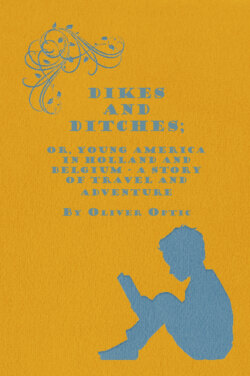Читать книгу Dikes and Ditches; Or, Young America in Holland and Belgium - A Story of Travel and Adventure - Oliver 1822-1897 Optic - Страница 8
На сайте Литреса книга снята с продажи.
ОглавлениеPREFACE.
Dikes and Ditches, the fourth of the “Young America Abroad” series, is a continuation of the history of the Academy Ship and her consort in the waters of Holland and Belgium. As in its predecessors, those parts of the book which lie within the domain of history and fact are intended to be entirely reliable; and great care has been used to make them so. The author finds his notes so copious, and his recollections of the Low Countries so full of interest, that he has felt obliged to devote a considerable portion of the work to the geography and history of the country, and to the manners and customs of the people; but there is so much that is novel in the region itself, and so much that is stirring and even “sensational” in the history of the sturdy patriots of Holland, that he hopes his young friends will not complain of the proportion in which he has mingled his material. It would be a very great happiness to him to have excited a sufficient degree of interest in these countries to induce the boys and girls to read Mr. Motley’s inimitable works, “The Rise of the Dutch Republic,” and “The History of the United Netherlands.” The writer is confident that young people will find these volumes quite as attractive as the story books of the day.
Dikes and Ditches has its independent story of the adventures of the students. Though the Academy Squadron has thus far been remarkably fortunate in the character of its instructors, Professor Hamblin proves to be an exception, and the crews of the ship and her consort are unhappily plunged into sundry disciplinary tribulations by his overstrained dignity, and by his want of discretion. The young commander of the Josephine suffers from the evils of a divided authority, which brings him into conflict with the senior instructor before experience suggests the remedy. While the principal is compelled to punish the students for their misconduct in “hazing” the obnoxious professor, he also finds it necessary to abate the nuisance of a conceited, overbearing, and tyrannical pedagogue. Boys cannot be expected to be angels in school, until their instructors have soared to this sublime height.
The author of the series, more than ever encouraged by the hearty and generous favor of his readers, submits this volume to their consideration, trusting that they will at least appreciate his earnest efforts not only to please, but to instruct them.
Harrison Square, Mass.,
April 9, 1868.
